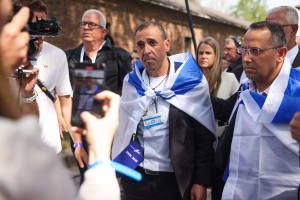Israel winning cyberwar against Iran, says former officer of elite IDF intelligence unit

A former officer of the elite IDF Military Intelligence Unit 8200 says Israel continues to successfully defend against increased Iranian cyberattacks since the Hamas massacre on Oct. 7.
Col. (res) Bobby Gilburd, who is Chief Ideation Officer at the private company Team 8, told The Jerusalem Post it is necessary to distinguish between Iran’s “psychological campaign” against Israel and its efforts to cause physical damage.
“The social media influence campaign is important, and bringing down the internet website of government ministries and [minor issues at] Ben-Gurion Airport lends itself to good photos and it shouldn’t happen – and there should be an investment to defend the websites – but Israel is still not getting hit like Iran, where their supply at gas stations got hit,” Gilburd said, referring to Iranian cyberattacks that took place against Israel in 2022.
That year, Iranian hackers successfully disabled air traffic control at Israel’s Ben Gurion International Airport for several hours. Additionally, Iranian hackers affiliated with Iran’s Islamic Revolutionary Guard Corps (IRGC) managed to disrupt government websites, including the Prime Minister’s Office (PMO). A logistics firm at the Ashdod Port also had its operations disrupted.
“The basic functioning of the [entire Iranian] gas distribution system [nationwide] was impacted in a way that civilians really felt it. This was a serious harm.”
Gilburd claimed that Israelis still trust the government to protect them from cyberattacks, as evidenced by the increasing use of digital means in their daily lives.
“Yes, they [Iranian affiliated hackers] succeeded, but [the Israeli] people don’t feel like the government is unable to defend us. More Israelis are moving their electricity to a smart digital counter. This is a good trend. It is also more vulnerable to a cyberattack, but Israelis do not consider this transition to be a source of concern which Israel is unable to defend against. In Iran, people feel unprotected in the digital domain,” the former intelligence officer said.
Following the Oct. 7 terror attack, Gilburd returned to serve in Unit 8200 for six weeks. The unit has been blamed for intelligence failures that led to Hamas' surprise invasion of Israeli southern border communities, but Gilburd expressed confidence that the IDF unit would recover. He noted that an investigation would determine where the blame truly lies.
“Unit 8200 will rehabilitate itself. From the first day, people adapted to both continue the fight and take responsibility [for October 7]. Everyone says something was not acceptable, at every rank and level. We needed to accomplish something, and it did not work. There will need to be a different political leadership. The IDF and Unit 8200 also took responsibility. But they have the capability both to probe and to fight because we need to fight.”
Gilburd stated he trusts the IDF to know how to perform a thorough probe to prevent future intelligence failures.
“We will carry out a probe not just to say who failed, but also to make sure that any problem from October 7 does not recur tomorrow. I served for 26 years, and the IDF knows how to perform probes and take them seriously to get to the root causes of an issue. And the IDF can change. I am calm and think the IDF can do two things at the same time.”

The All Israel News Staff is a team of journalists in Israel.
You might also like to read this:

















